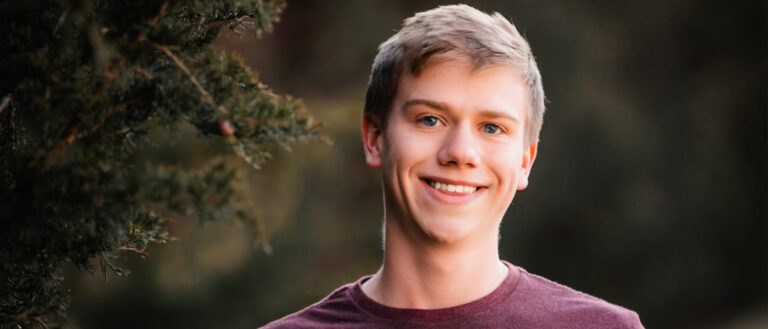Jackson Schrader came to Case Western Reserve with many talents: A three-sport athlete in high school, he was also an accomplished musician and valedictorian of his graduating class.
Yet once Schrader arrived on campus as a transfer student this fall, those around him discovered another quality that outshone them all: a deeply caring soul.
Classmates described him as the kind of person who listened closely when others spoke, and responded in ways that made them feel heard—and valued. He made a point of always greeting one instructor in Portuguese, her native language, and asking peers how they were doing.
“The way he always said ‘Hi, Jolie,’ made me feel important,” explained first-year student Jolie Held, “especially on days when I wasn’t feeling great.”
Today, they and others are mourning Schrader, who died off campus earlier this week. He was 19.
Among those grieving is the co-instructor for his SAGES Seminar, “Beyond Words: Language, Culture & Society.”
Schrader, Marion Wolf said, was “a bright presence in our community who lit up the room.”
A native of McPherson, Kansas, Schrader received his high school diploma in 2020. One of a handful of students to earn a Presidential Scholarship from Kansas State University, he enrolled at KSU that fall.
Yet when COVID-19 forced his first year of college online, Schrader began to consider other options. With dreams of becoming a doctor, he found himself drawn to Case Western Reserve, a university with an impressive pre-med track and proximity to major hospital systems.
His interest in medicine stemmed from two years working as a certified nursing assistant in Kansas. Colleagues and the patients in his care were quickly taken by Schrader’s intelligence, quick wit and sense of humor, his parents said.
“[Jackson] was really able to connect with people and be empathetic,” his father, Matthew, said. “He was just a kind, genuine person. He was very insightful about how other people were feeling and what they needed.”
His mother, Ami, recalled how quickly her son fell in love with Cleveland on their first visit. He raved about the art museum and cultural opportunities, she recalled, and “he was most excited about the number of food choices nearby.”
Once on campus, Schrader was eager to begin volunteering. He enrolled in the Center for Civic Engagement and Learning’s Civic Engagement Scholars program and signed up for Semester Serves. Specifically, he volunteered with Seeds of Literacy, a local organization dedicated to helping adults earn their GEDs.
“Jackson clearly had a heart for service,” shared Erin Corwin, assistant director at the center. “In group conversations, he was very engaged and interactive, always asking great questions. You could tell he understood the why for volunteering; he truly wanted to give back.”
Among his courses, the SAGES seminar led by Katia Almeida, senior instructor in the Department of Anthropology, proved to be his favorite, his parents said.
“Jackson really knew how to listen when you were speaking, how to absorb and acknowledge the relevance of what he was learning,” said Almeida, who hails from Brazil. “He really wanted to expand his horizons and interact with people from different walks of life.”
But he also maintained a sense of fun, classmates said. A prime example, according to Held, involved a group assignment to give an example of plagiarism.
“He just started writing, copying directly from a source and concluded it with something along the lines of, ‘This is my original work, and my argument is right, because I’m the smartest person in the room,’” she said. “The whole class laughed for a solid minute when he was asked to read that response out loud.”
Such moments make Schrader’s passing even more difficult, observed first-year student Tiffany Zhang, who shared two classes with him.
“I’m heartbroken that I didn’t get more time to know [Jackson] better,” she said. “From what I experienced in the time I did know him, he was truly a great person.”
Schrader is survived by his parents and his older brother, Nolan.
Students who would like support during this time are encouraged to contact counseling services at 216.368.5872. This line is staffed by a counselor 24 hours a day, seven days a week. Faculty and staff can access counseling at any time by calling IMPACT Solutions at 1.800.227.6007; they can learn more about their programs at myimpactsolution.com.

